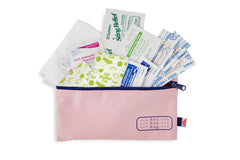Village Maternity started in 1983! Can you tell us about how Village Maternity started?
My mom, Shelley Capretto, and her business partner (and neighbor), Brigid Stricks, felt there weren't places in Seattle for new moms to learn about safe and helpful products for baby, find fashionable maternity clothes or connect with other new parents that were going through the same exciting and stressful phase of expanding their families. They founded Village Maternity as a solution to that problem.
Seattle and maternity wear both looked very different back then! Paint a picture of what maternity wear and Seattle looked like in 1983.
Maternity clothes in the 80s were definitely different - more tented silhouettes and sweeter details like bows and oversized collars. Styles that hugged the bump or flaunted your figure were not popular - clothing was used to hide the body rather than show it off. Village Maternity also rented evening wear and wedding dresses in the 80s! Black tie was much more prominent in the 80s and there was always a rack with sequins and glam for the galas and formal events for moms to be. Hard to imagine right now!

And what about you, Anna? As the now owner of the boutique, you just had a baby yourself--congratulations!! You must have been a baby yourself when the shop opened. How did you come to own and run Village Maternity?
Thank you! I actually just had my second (I have a daughter, Edie, who is 2, and just had my son, Bowman). I obviously grew up around Village Maternity, however I had never worked for my mom or in the store. After business school, I was working in NY in strategy for big retailers-- Banana Republic and Kate Spade--when my mom was diagnosed with a really rare cancer. I moved back to Seattle and unfortunately, my mom passed away soon after.
I inherited Village Maternity in 2013 and it has been a really nice way for me to stay connected to my mom and continue her legacy. While the brand has evolved, we have worked to stay true to her original mission, which feels even more relevant today than ever.
I also purchased a wholesale clothing line, NOM Maternity, in 2017 in order to infuse a bit more fashion into maternity clothes. We moved design headquarters from LA to Seattle and now sell our line in boutiques worldwide, as well as through our site, NOMMaternity.com.

How has being a parent yourself changed the job for you?
Being a parent has definitely reinforced that there are a million ways to raise a baby and that community and support is the most important piece of having a child. After my first baby (and pre-pandemic), we launched a series of classes--both paid and free--at our boutique, called 'It Takes A Village'. We partnered with experts around the city to offer modern parenting, relationship, and pregnancy/ birthing classes, but the most exciting part was watching moms connect and build lasting relationships.
On top of that, I have always known we had a great buying team at Village Maternity, but after having a child and using ALL the products for both pregnancy and postpartum, I can confidently say that the research my team does to find products that are thoughtfully designed and safe for mama and baby is incredible. We believe in quality over quantity when it comes to STUFF and I 100% believe in and use all the products we carry in our store.
How has Village Maternity managed to adapt, and not only survive but thrive into its 4th decade of business? Village Maternity is a well-known boutique in the industry. What is the key to your success?
In order to succeed in retail, you always have to evolve. Since I took over the store in 2013, we have launched our own maternity label, classes and our website, where we also offer online registries. I keep reading articles that say retail is dead. I firmly believe that retail is not dead, BORING retail is! Our team at the store is knowledgeable about everything we carry, including hospital grade breast pumps, how to dress your changing shape, what to put on your registry and so much more. They are truly experts in the field and our customers know they can come to us for not only great products, but also to answer the millions of questions that come up during pregnancy and the early years of having a new child.

What trends do you see parents gravitating towards as they shop these days? Any changes to highlight?
I think women feel much more confident celebrating and showing off their changing body, which is really exciting and empowering! I love when a customer walks out with a fitted dress that they would never ordinarily wear while not pregnant. Pregnancy can be a really fun time to play with new styles and silhouettes and celebrate your body! We are also seeing a lot more brands and customers prioritize sustainability (yay!) From organic cottons to recycled fabrics, we are seeing more and more brands invest in ways to cut down on waste and create products that last.
We were so excited when you reached out to us about Kibou. What was it about Kibou that made sense to you for your customer community?
For a long time, diaper bags were all about the bigger, the better and we just found that large diaper bags were not a solution for everyone (or these days, many people). We loved the simplicity and forward thinking that Kibou offers parents. As a mom myself, I rarely pack my bigger diaper bag and often just threw my to-go changing pad in my purse. With two kids, the ability to be hands-free, but also carry the few things I need felt freeing!

As veterans in the industry, what advice do you have to offer to parents who are overwhelmed with the baby registry process?
There are quite a few stores and companies that make you think you need a million things for baby, which just isn't true. Every baby is different; you may have a baby with eczema, one that won't take a certain bottle or one that doesn't sleep (ok, maybe that's all babies?) You don't need to buy every swing, rocker and bottle on the market. Start small and you can always order what you are missing. Also, babies are learning just like you are, so what seems like an insurmountable problem one day has completely gone away by day 3. If you don't have a store like Village Maternity, talk to friends and see what products they recommend. Everyone will have a different opinion, but I would encourage parents to not feel the need to buy everything right away.
What about advice to other baby and maternity shop owners? What advice would you offer them?
Invest in people. Great customer service and employees that know your product and are invested in your store are so important!
And how about us? What's something you've learned about parents and gift givers over the years that we'd benefit from knowing as we do our best to make life easier for on-the-go parents?
All parents want what is best for their child and what is often best for their child is a happy and supported parent! While most baby showers and parents-to-be focus on what the baby needs, it is just, if not more important to make sure the parents are supported and have the things they need to make their life easier. Investing in products to help with nursing and pumping, clothes that make moms feel comfortable and beautiful, and products like the Kibou diaper bag that make getting out the door easier are essential! I always encourage gift givers and new parents to not just buy for baby, but also buy for moms and dads!





Leave a comment